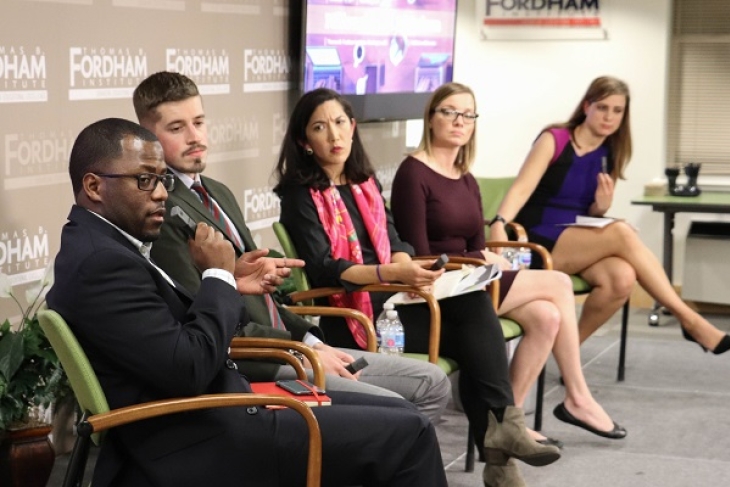The preferences, opinions, and predilections of millennials—currently the largest generation in America—have already reshaped American office culture, news consumption, and taxi-hailing. But what (if anything) do their opinions portend for education and ed reform? To explore the millennial perspective on education, Fordham hosted “Millennials in Ed Reform,” using recent research from Echelon Insights and the Walton Family Foundation as a jumping off point. Joining Fordham’s Director of External Relations Alyssa Schwenk in conversation were Kristen Soltis Anderson, co-founder of Echelon Insights and author of the report; Lea Crusey, founder of Allies for Educational Equity; Mendell Grinter, executive director of the Campaign for School Equity; and David Murray, teacher and District 1 school board member in Prince George’s County, Maryland.
Diving into Echelon’s survey data, Soltis Anderson pointed out several key points about millennials’ opinions on education. First and foremost, millennials view education as the most important tool for getting ahead in life. They generally have a favorable opinion of the education they received, but have a more lukewarm view of the country’s current education system. By a three-to-one margin, millennials argue that sweeping changes are needed. And, looking at the overall picture, Soltis Anderson said this generation is frustrated by today’s policy problems but not pessimistic about fixing them.
With this frame in mind, the panel turned to the topic of what role millennials see themselves having in education as they become parents and move into leadership roles.
Crusey said that there is much self-reflection; that millennials are thinking about what roles they should be playing to become more active members of their communities. Soltis Anderson described the millennial attitude towards public policy as “first, do no harm,” meaning that they favored policies that helped the most people while harming the least. Grinter added that when talking about social justice issues in the classroom, “it is important to have students see and recognize the issues around them.” Murray, himself a teacher, exemplifies this millennial mindset, deciding to run for his local school board.
Even in the time millennials have been out of school, the world has changed significantly, Grinter argued, pointing out that millennial parents are not only open to significant changes to the education system, but also to identifying and addressing its problems. “In order to face the big shifts in education, we need to meet parents where they are and provide them with information,” he said, adding that millennial parents are starting to have conversations with their kids about facing and addressing the structural and systemic education issues communities are facing. “When we talk about social justice in the classroom, it’s important to have students see and recognize the issues around them,” Grinter said.
Soltis Anderson also pointed out that millennials are generally receptive of school choice once they understand what that issue is, though the degree of their acceptance depends on what the context is and how the issue is presented. The Echelon survey found that 74 percent of millennials think every child should have access to a good school, and that parents can effectively place their student in one, regardless of zip code. Crusey likened this to asking people if they supported tap water over bottled water—it depends on the situation for most people. Crusey added that millennial parents are increasingly embracing school choice as one solution to the changing demographics of schools as many urban communities deal with gentrification. On how to frame charter schools for millennials, Grinter argued that “we need to focus on the quality of our schools before we debate the question of if we support charter schools or not.”
Soltis Anderson said that millennials still hold a fair amount of optimism about cutting through red tape and making big, necessary changes. And this appetite for change drives how millennials are adopting and using new education technology and ideas—both as students and new parents. Murray underscored that millennials care about how teaching is done and with what tools, saying “It’s about personalized learning and we have more data about our students than ever before—it lets us know where students are and what they need to keep growing.” Soltis Anderson said that “millennials have grown up in the world of tech; they don’t need education to teach them about using technology but instead use technology to teach the classic skills.” However, on new initiatives and advances in data, testing, and ed tech, the panelists all stressed the importance of keeping parents informed, which helps maintain trust between teachers and parents.
Millennials recognize today’s policy problems and are already exploring possible solutions. Each panelist stressed that, contrary to stereotypes of apathy, millennials are eager to tackle the challenges necessary to ensure a stronger education system for their children.

